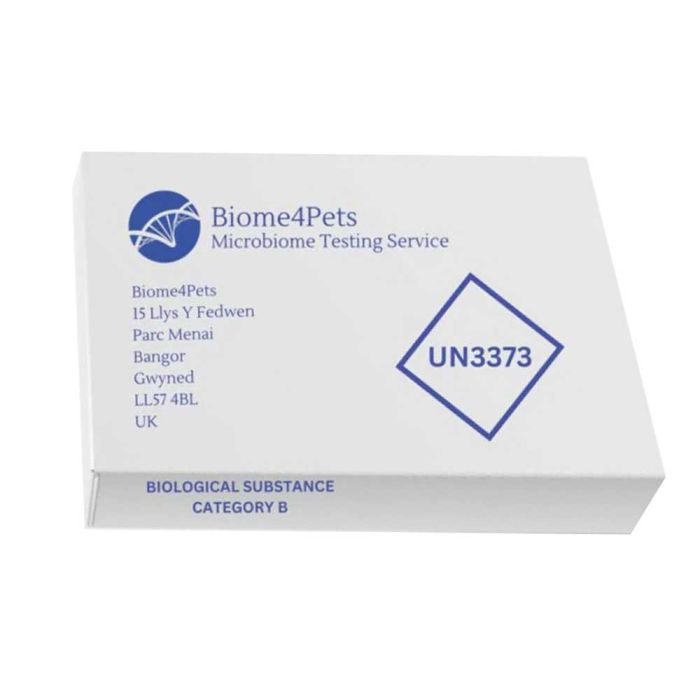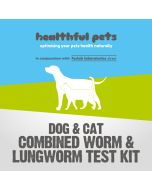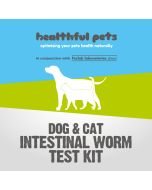PetBiome Faecal Test Kit for Pets
SPECIAL INTRODUCTORY PRICE OF £165
ThePetBiome Faecal Test uses state of the art technology to count and identify the complex diverse community within the gastointestinal tract of cats and dogs (also suitable for guinea pigs, pet birds and ruminants).
Problems within the gastro intestinal tract of companion animals are common and the information from the PetBiome test will help the pet owner to identify imbalances and manage the diet to suit the gut community.
Between 500-1,200 species of bacteria are identified, including the good the bad and the ugly (verrucomicrobia). Allowing the pet owner to make better descisions to promote and prolong health.
DNA extraction and analysis is complex please allow 8-10 weeks from the time we receive your sample to receipt of results by email.
The microbiome is home to over 1014 bacterial species, with links to immune function, energy and nutrient availability.
Dysbiosis (imbalances) are common.
The gut bacteria, eubacteria, roseburia and clostridiales, help to form a barrier against invasion from pathogenic bacteria, the barrier is called the 'Resistome'. Many of our pets have low levels of these good gut bacteria. The NGS test will accurately pinpoint low levels of all the good gut bacteria and make personalised recommendations on how best to increase them through dietary changes.
Pet Biome's Story
In the past two decades, there has been a massive escalation in our understanding and appreciation of the microbiome and host physiology. The inhabitants of the gut contribute as many cells and many times more genes to the canine holobiont, influencing every action from digestion, metabolism to immunity, including the function of the brain. Imbalances or dysbiosis have been associated with multiple diseases or animals and humans, there is optimism that in human medicine at least this will allow for new therapies and treatments to be developed. The conclusion from human medicine is that the microbiome is complex, and progress is most likely to be driven by long-term data -collection through scientists working in the field.
Biome4Pets continues to grow its population data library of dogs, profiling dogs in health and disease using the bioinformatic database of the largest genomic sequencing company in the world (Illumina).
Since 2014 PetBiome have done thousands of samples from dogs around the globe. Each sample is processed through the IBERS genomic sequencing lab at Aberystwyth University. They are constantly striving to add to the type of testing we do, including Emerging Pathogens, Aspergillus, Viruses and the Mycobiome, all from one sample. They have access to AI which can rapidly convert data into gut dysbiosis profiles which are then compared against the database. PetBiome are here for the long term, it’s a fantastic time to be in microbiology, the tools and access to new science is mind-boggling, hope to take you with us on the journey
Pet Biome began researching the microbiome of dogs in 2013 as their parent company Phytorigins. They were fortunate to work with some of the leaders in the field based at Aberystwyth University.
At that time sequencing technology was in its infancy and they had to freeze the faecal samples immediately after collection which made commercialisation impossible due to the cost and difficulty of dry ice transportation. To complete their first research projects they drove to collection points around the country in a refrigerated van, donated by the university. This enabled us to begin to gather the important data needed to not only identify the bacteria 'Who's in there' but to also make sense of the complex inter-relationships of the microbiome.
The first presentation of that research was made by Gabi de la Fuente at the ESVCN a non-profit organisation relating to academic research in veterinary nutrition, comparative nutrition and nutrition-related diseases.
In 2018 and with the advent of 16s rRNA sequencing we were finally able to offer a service to pet owners. We were very excited to present our findings to vets initially and attended several animal veterinary exhibitions.
Collaborative research projects with universities and veterinary hospitals/practices include.
- Inflammatory biomarkers in the oral microbiome – horses and dogs
- Obesity in Dogs - a 2-year Project with a national pet food company, several vet practices, and the microbiology team at Aberystwyth and Bangor Universities.
- A four-year project on obesity biomarkers, and changes in gut bacteria in the gut-horses and dogs involving the leading team of gut microbiome researchers in the UK with Professor Jamie Newbold Kirsty Dougal and Gabi de la Fuente.
- The Extraction of a novel compound to help reduce the effects of obesity including the reduction of inflammation in the gut.
- Assimilation of raw data from the genome and profile this against the complex internal microbial communities and the phenotype status of the dog (breed, health and age).
The Use of ML/AI: In the last 12 months we have developed and completed over fifty different gut microbiome profiles linking dysbiosis/imbalances with health conditions and diseases, we have achieved this by sequencing thousands of samples from affected and healthy dogs and using collaborative research with leading AI developers in the UK, Australia and Silicon Valley USA.
An Overview of Delivery Options (Please note that the delivery times are from the point of dispatch)
We always aim to dipatch orders as quickly as possible. Orders received before 3.30pm (1.30pm cut off for Courier deliveries) will be dispatched the same day. An overview of our shipping options with typical delivery timescales are detailed below. Please be mindful that during peak times delays may occur. We also cannot accept responsibility for late deliveries due to unforseen circumstances outside of our control.
Please note that we do not send orders addressed to a HOTEL address or POST OFFICE address, unless prior arrangement has been made with us.
|
Standard UK Delivery (orders under 4kg) Includes Northern Ireland. |
Options of Royal Mail Tracked 48 (typically 2-3 working days) and Tracked 24 (typically 1-2 working days). Free Delivery on orders over £48.99. Orders over 4kg will need to be sent with APC. | £3.45-4.29 |
|
Next Day Delivery - APC Excludes Highlands, Islands and Northern Ireland). For further details of the postcodes in these areas can be found HERE. |
Next day Courier service (standard deliveries Monday to Saturday inclusive) with APC. You will receive a text on morning of your delivery with a 2 hour delivery window (plus ability to track driver location). |
£7.49 |
|
Orders over £48.99 |
Orders over £48.99 (weighing less than 4kg) are sent on a Royal Mail Tracked 48 service. There is however the option to upgrade your shipping at checkout as follows:
Orders over £200 will be shipped on a priority service and detailed at checkout. Orders weighing more than 4kg will need to be sent via APC at an increased cost. |
FREE |
| Click & Collect | Collection from 12 Dalby Court, Gadbrook Business Centre, Northwich, CW9 7TN. View in Google Maps. Orders will be available to collect Monday to Friday. 8.00am to 4.30pm. We will email you to let you know when your order is ready to collect. Orders not collected within 14 days will be refunded | FREE |
Please note:
- We do not work at weekends, so orders received after the cut off times on Friday will not be dispatched until Monday (There will be special arrangements for Public Holidays when orders will be dispatched on the next working day).
- Please double check your delivery address in your order confirmation email and contact us straight away if this needs to be changed.
- Once we have received an order it will not be possible to cancel your order, however please contact us and we will see what we can do.
- If in the unusual situation there is a problem with your order, such as a stock error or an issue with delivery, we will make contact with you to discuss options.
- For full details of our shipping options, please see our Delivery & Returns section of the website.
An Overview of Returns and Refunds
Unless faulty, you can only return a product if unopened, unused and with the original seals, packaging or tags intact. Unfortunately, it is also not possible to issue a refund for a supplement that your pet doesn't like or doesnt agree with them. All animals are unique with their own likes and dislikes.
You can return an unwanted item for a full refund (including minimum postage costs you could have chosen when placing your order) within 14 days of receiving it. You must notify us of your intention to cancel the order and you must return the item to us within 14 days of notifying us.
When returning an item, please ensure you take reasonable care as any damage in transit will result in us being unable to refund part or all of the money that you have paid. You are responsible for the cost of returning an unwanted item to us. Using Royal Mail “Send and Item with Click & Drop” is an option, as this enables you to have your order collected from your house. Further details can be found here: https://send.royalmail.com/
Our return address is: Returns Dept., Healthful Pets, 12 Dalby Court, Gadbrook Business Centre, CW9 7TN.
Refunds are typically processed within 2 days of receipt of a returned item, but under certain circumstances, such as busy /holiday periods, your refund may take longer to process. The 14- day limit to request a refund does not apply to any item which is faulty, unfit for purpose, or not as described at the time you placed the order. For damaged and faulty items, you have 30 days to contact us. We will cover the cost of these returns and once received will process a full refund.




